Songwriting: How it Works
June 25, 2019A number of years ago, I took up songwriting. How it came about is a long story of serendipity that is better saved for the book I’m currently writing. At the time, I saw songwriting as just another lark in my ongoing quest to experience every aspect of life, whether it be acting, cooking or mountain climbing. I certainly never dreamed it would someday evolve into my own music studio, WestSonic Music. Nor did I envision I would be working with two talented songwriter/producers, Ian Prince and Dave Corman, along with a string of top liner/lyricists such as Lauren Barker, Rachel Suter and many others. My music experience is reminiscent of how I got into the film and tv business. It started with a passion for film that lead to the creation of a small film distribution company in the mid 1980’s, followed by the launching of Lionsgate Entertainment in the late 90’s and eventually to my current company, Thunderbird Entertainment. These are very solid businesses, but if you had asked me in 1986 what my plan was, I would have answered something along the lines of, “I’m just learning and having fun.”
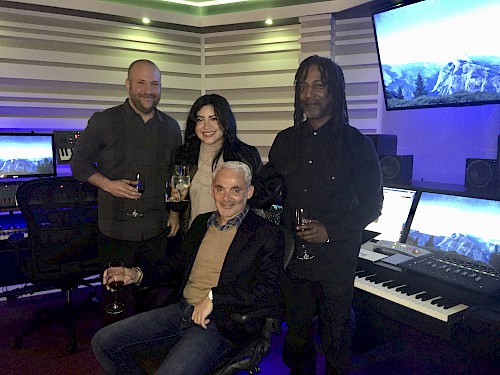 Today, WestSonic collaborates with a number of young artists it sees as promising, helping them create a portfolio of songs. Since launching the studio I find I’m often asked, where does the inspiration for a song come from? Or, how does the songwriting process work?
Today, WestSonic collaborates with a number of young artists it sees as promising, helping them create a portfolio of songs. Since launching the studio I find I’m often asked, where does the inspiration for a song come from? Or, how does the songwriting process work?
Like any creative pursuit, songwriting is a personal journey and no two artists do it the same way.
Bob Dylan’s approach was steeped in folk tradition and he has said it often began with a melody he had heard somewhere else. Folk writing tradition is largely an oral one, born before the days of recording. Songwriters heard others’ songs and then changed them to suit their own point of view. So that’s one place to start. Interestingly, he would often use his first draft as his final lyrics and could complete them in a matter of minutes.
For us, most of the time we like the artist to initiate the subject matter and direction of the song. This is important because the artist is the one who has to perform the song and thereby sell it. It’s easier to make something sound genuine when you can relate to it. If the artist is unsure of what direction to take, we will then initiate conversation - about anything and everything. At this stage, there are no bad ideas and everything is on the table. I love to tell stories about my life experience or an interesting historical figure or sometimes, cite a line from a movie. The conversation can go anywhere. We take notes and try and mould them into song lyrics. If that doesn’t lead anywhere useful, we might seek a musical reference (a la Dylan) that makes sense for the artist to explore. We will normally spend an entire day writing one song, most times in the comfort of my home where the atmosphere is relaxed, and we always break for a home-cooked lunch. We joke and laugh a lot during these sessions and it never feels like work. Once the song is written, Ian and Dave take it to our WestSonic studios to complete its production.
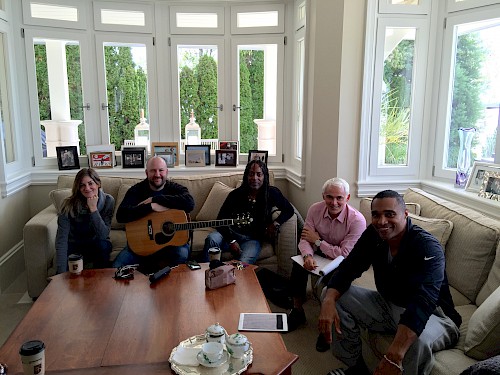 Other artists do it differently. Singer songwriter Nick Cave has said if he’s at home in Brighton, he’ll go into his office every day and work, “whether I feel like it or not.”
Other artists do it differently. Singer songwriter Nick Cave has said if he’s at home in Brighton, he’ll go into his office every day and work, “whether I feel like it or not.”
Songwriters are always writing in some shape or form. Many will carry a notebook around with them, jotting down phrases that come to mind. At this stage, it’s important not to overthink it, just get the thought on paper. Leonard Cohen is said to have always been writing. In a 2014 interview with Rolling Stone magazine he said, “If I knew where good songs came from, I’d go there more often.”Unlike Dylan, he famously tinkered with the lyrics of his songs for months and in the case of his gospel piece, “Born in Chains”, for decades.
It’s also important to write about first hand experiences. This is one way of ensuring that the writer can engage with the potential listening audience. Relating to common events that happen to everyone is a tried and tested way of identifying with your audience. As a result, you will find many examples of these types of songs in popular music. My lyrics tend to skew to the darker, heartbreak side of life. I don’t do well with “sunshine and lollipops“ lyrics. Personally, I believe the best songs are written when one is either madly in love or completely devastated by it. That’s when the emotional juices are really flowing.
Conversely, never try to write about a life experience you know nothing about. I tried to write lyrics to a rap song once and I could literally feel Dave and Ian’s eyes roll when they emailed their feedback. It truly sucked.
Our group likes to start with a strong direction and preferably a strong title as well. Having a title really helps us to solidify the vibe of the song. Before we get into the chorus topline, we might start working on a verse first. This continues as we work on the song in sections, trying to tell a compelling story at the same time. In a successful session, ideas will flow freely and the good ones are quickly identified.
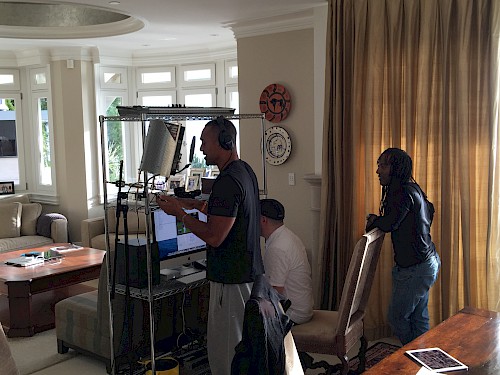 A good example of how a song comes about is one we wrote four years ago. The title of the song is “ Unconditional“. The inspiration came from the breakup of a brief relationship that was destined to fail. Although brief, it was sweet and caring and when we said goodbye it was with the best of wishes from each of us. When my co-writer Lauren Barker asked me how I felt about saying goodbye, I came up with the word “unconditional”. It described accurately that although we were parting ways, I wished her well and hoped she would find love and happiness with someone else. There were no strings attached to my feelings. Lauren came up with a beautiful melody and it didn’t take us long to finish the lyrics together. Eventually it was produced by Ian and Dave and recorded by my friend, the soul singer Sean Jones. One of my proudest moments was hearing him perform it, with my daughter at my side, at Vancouver’s Rogers Arena in front of 18,000 people.
A good example of how a song comes about is one we wrote four years ago. The title of the song is “ Unconditional“. The inspiration came from the breakup of a brief relationship that was destined to fail. Although brief, it was sweet and caring and when we said goodbye it was with the best of wishes from each of us. When my co-writer Lauren Barker asked me how I felt about saying goodbye, I came up with the word “unconditional”. It described accurately that although we were parting ways, I wished her well and hoped she would find love and happiness with someone else. There were no strings attached to my feelings. Lauren came up with a beautiful melody and it didn’t take us long to finish the lyrics together. Eventually it was produced by Ian and Dave and recorded by my friend, the soul singer Sean Jones. One of my proudest moments was hearing him perform it, with my daughter at my side, at Vancouver’s Rogers Arena in front of 18,000 people.
I love writing songs and especially the collaborative way in which we do it. When we are writing, I escape into a world where I need to tap into my emotions, explore my inner passion and nurture my creative side. It’s a welcome respite that allows me to clear my mind from all the other stresses of my business and philanthropic work.
The best moment is when we put down the rough demo to a good song and play it back. Hearing the combination of the track, the melody and the voice giving life to a story makes all of us sit back and smile. It’s an art that is pure magic.
Take a listen to “Unconditional” here.


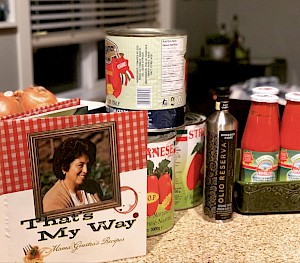

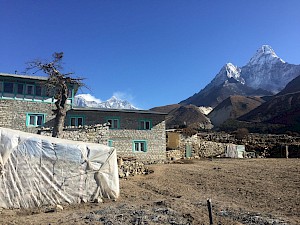
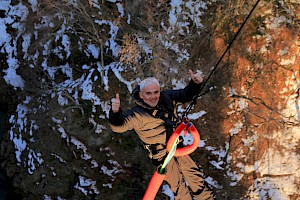

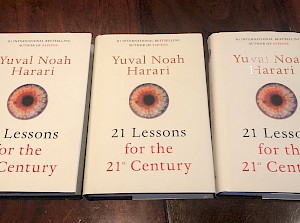
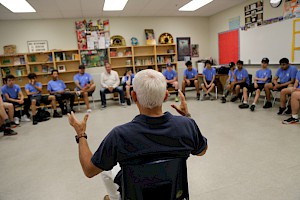
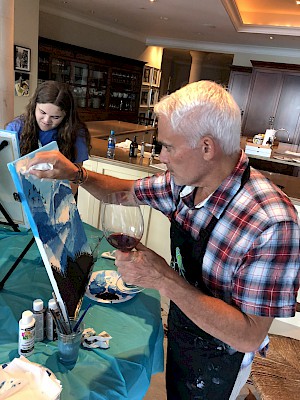
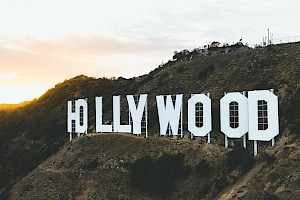
Comments
Irene Corman 7 years ago
Hi Frank,
Dave's mom here. Really enjoyed reading this post. A lovely story about writing stories to music.
Best,
Irene
Reply
Daniella 7 years ago
I need to see these rap lyrics!!
Reply